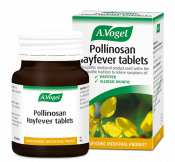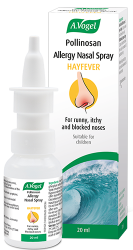Allergic rhinitis and a runny nose
The immune system fires up a dramatic response when it comes into contact with allergens like pollen, mould spores, animal matter and dust mites which it deems as dangerous. Histamine is released for example, which results in symptoms like inflammation in the nasal passages. This swelling can lead to congestion which is commonly associated with allergic rhinitis.
However, to tackle these allergens, the body also increases the amount of fluid that is secreted from the mucous membranes that line the inside of the nose. This is an attempt to trap allergens and banish them from the body and explains why a runny nose may become problematic.
How to tell if allergic rhinitis is causing your runny nose
A runny nose could easily be confused with a cold or flu but there are a few things that can help you distinguish the two.
Get allergy tested – if a runny nose regularly causes problems for you, it may be time to visit a doctor who can provide an allergy test. This is done through either a blood test or a skin prick test – here the allergen is placed on the skin, the skin is then pricked and if it reacts, it’s a sure sign you are allergic to that substance.
Problematic pollen – pollen is the biggest cause of allergic rhinitis and, as plants pollinate between March and June, this is when symptoms are likely to emerge. So, if your nose is often runny around about this time, it’s probably pollen that’s the cause.
Watch out for patterns – are your symptoms worse at home or on the move? Is it more of an issue in your bedroom or in the garden? Keeping an eye on these things can help you determine the cause and then, once this has been determined, you can take steps towards tackling the issue.
Risk factors
There isn’t always a clear explanation as to why someone might suffer from allergic rhinitis – it can be the case that it just happens! However, in some cases there a few things that may have increased your chances of getting it or that can.
Age – many people assume that allergic rhinitis develops in childhood and, if you don’t get it at this time, then you never will. However, this is a big misconception as allergic rhinitis can develop at any age. Nevertheless, it is more likely to develop in childhood.
Genetics – allergic rhinitis can be hereditary so, if a close family member like a parent suffers from the condition, it would be unsurprising if you then had the condition as well.
Other medical conditions – unfortunately, your risk of having allergic rhinitis can be increased if you already suffer from another medical condition. Food allergies, eczema and asthma are all commonly associated with it.
Working environment – allergic rhinitis is often more common in people who work in environments that expose them to certain materials like animal dander, chemicals, storage mites, fumes, and dust.
What can you do?
Without venturing into treatments, there are a few things you yourself can do to address the problem of a runny nose.
Apply a damp cloth – some people find that applying a warm, damp cloth to their nose and forehead helps sooth nasal problems.
Avoid histamine-rich foods – there are a number of food and drinks that are high in histamine which, if consumed, can exasperate your symptoms. So, stay away from smoked meat, milk and white chocolate, alcohol, caffeine, foods high in sugar, foods with artificial colourings, and cashew nuts. You can opt for fresh fruit and vegetables instead, alongside fresh fish, fresh chicken, herbal teas, and eggs as these are all low in histamine.
Keep hydrated – consuming lots of water helps a runny nose as it helps to loosen and thin mucus so that it can flow quicker and easier from the nose.
Stay away from milk-based products – studies have shown that mucus is made thicker by the consumption of milk so, to prevent your symptoms from getting worse, any products containing this ingredient are best avoided when suffering from a runny nose!
Steam – this is often used to address nasal problems like a runny nose. That’s because the water and heat contained in steam helps to thin the mucus in your sinuses and sooth irritated nasal passages. This means that warm showers and baths, along with hot drinks and liquids, are a great idea at this time.
Try Echinacea – in cases of allergic rhinitis the immune system constantly produces lots of histamine in order to fight off allergens it deems dangerous. This puts it under a lot more strain than would normally be the case so, to help it out at this time, it may be helpful to take some Echinacea. This plant has traditionally been used to support the immunes system and can be taken in the form of Echinaforce Echinacea Drops.
Herbal remedies
There are number of herbal remedies that help address the symptoms of allergic rhinitis including Polliosan Hayfever Tablets. These contain seven tropical herbs that help deal with issues such as sneezing, watery and itchy eyes, inflammation and, of course, a runny nose. 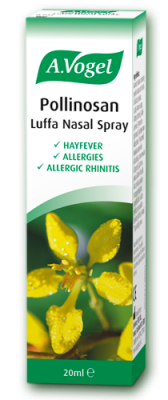
It is also worth trying the Pollinosan Luffa Nasal Spray as this cleanses the nasal passages of allergens to help ease the problem of a runny nose. Also, unlike man y other nasal sprays, it can be used for a pro-longed period of time without doing any damage to the inside of the nose.
Treatments
As always with allergic rhinitis, if your symptoms mean you can’t go about your life as normal, then it’s time to visit your doctor for some further advice.
Anti-histamines – these can be prescribed by a doctor or, alternatively, may be handed out by a pharmacist. These are taken in tablet form and treat the many symptoms of allergic rhinitis by blocking the release of histamine.
Steroid nasal sprays – this anti-inflammatory medicine can also be used to treat allergic rhinitis symptoms like a runny nose.





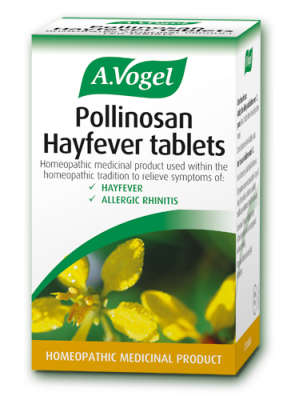
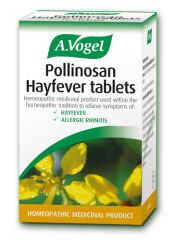 Looking for a solution to curb those hayfever symptoms such as itchy eyes, constant sneezing and congestion, then look no further than A.Vogel’s Pollinosan Hayfever tablets.
Looking for a solution to curb those hayfever symptoms such as itchy eyes, constant sneezing and congestion, then look no further than A.Vogel’s Pollinosan Hayfever tablets.
